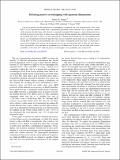| dc.contributor.author | Shapiro, Jeffrey H. | |
| dc.date.accessioned | 2010-01-29T20:13:51Z | |
| dc.date.available | 2010-01-29T20:13:51Z | |
| dc.date.issued | 2009-08 | |
| dc.date.submitted | 2009-03 | |
| dc.identifier.issn | 1094-1622 | |
| dc.identifier.issn | 1050-2947 | |
| dc.identifier.uri | http://hdl.handle.net/1721.1/51048 | |
| dc.description.abstract | A two-way protocol for defeating passive eavesdropping is proposed. For each information bit, Alice sends Bob T sec of signal-beam output from a spontaneous parametric down-converter over a pure-loss channel while retaining the idler beam with which it is maximally entangled. Bob imposes a single information bit on the light he receives from Alice via binary phase-shift keying. He then amplifies the modulated beam and sends the resulting light back to Alice over the same pure-loss channel. Even though the loss and amplifier noise destroy any entanglement between the light that Alice receives from Bob and the idler she has retained, she can decode Bob’s bit with an error probability that can be orders of magnitude lower than what is achieved by a passive eavesdropper who receives all the photons that are lost en route from Alice to Bob and from Bob to Alice. In particular, Alice and Bob can communicate at 50 Mbit/s over 50 km of low-loss fiber with an error probability of less than 10−6 while the passive eavesdropper’s error probability must exceed 0.28. | en |
| dc.description.sponsorship | W. M. Keck Foundation Center for Extreme Quantum Information Theory | en |
| dc.description.sponsorship | DARPA Quantum Sensors Program | en |
| dc.description.sponsorship | Office of Naval Research Basic Research Challenge Program | en |
| dc.language.iso | en_US | |
| dc.publisher | American Physical Society | en |
| dc.relation.isversionof | http://dx.doi.org/10.1103/PhysRevA.80.022320 | en |
| dc.rights | Article is made available in accordance with the publisher's policy and may be subject to US copyright law. Please refer to the publisher's site for terms of use. | en |
| dc.source | APS | en |
| dc.title | Defeating passive eavesdropping with quantum illumination | en |
| dc.type | Article | en |
| dc.identifier.citation | Shapiro, Jeffrey H. “Defeating passive eavesdropping with quantum illumination.” Physical Review A 80.2 (2009): 022320. (C) 2010 The American Physical Society. | en |
| dc.contributor.department | Massachusetts Institute of Technology. Research Laboratory of Electronics | en_US |
| dc.contributor.approver | Shapiro, Jeffrey H. | |
| dc.contributor.mitauthor | Shapiro, Jeffrey H. | |
| dc.relation.journal | Physical Review A | en |
| dc.eprint.version | Final published version | en |
| dc.type.uri | http://purl.org/eprint/type/JournalArticle | en |
| eprint.status | http://purl.org/eprint/status/PeerReviewed | en |
| dspace.orderedauthors | Shapiro, Jeffrey | en |
| dc.identifier.orcid | https://orcid.org/0000-0002-6094-5861 | |
| mit.license | PUBLISHER_POLICY | en |
| mit.metadata.status | Complete | |
